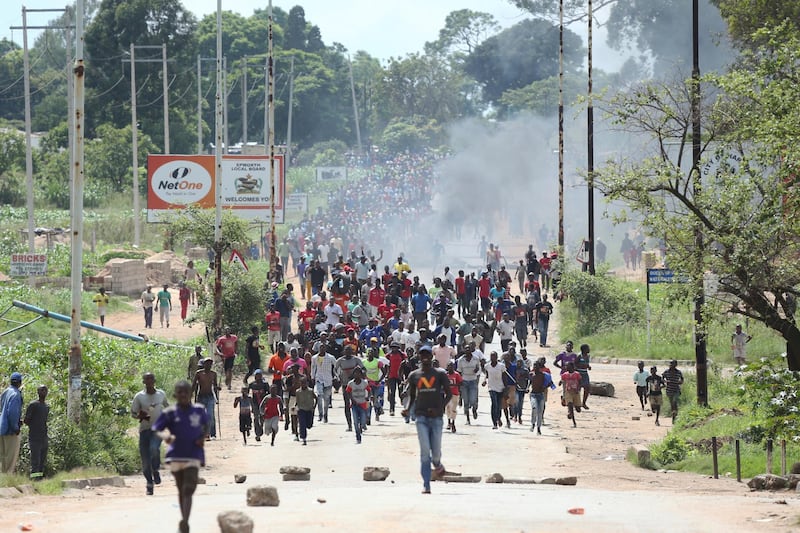It is said the reason Zimbabwe's president, Emmerson Mnangagwa, is nicknamed "the Crocodile" by his legions of Zanu-PF admirers is because of the innate cunning he employs against his political opponents.
It was a trait that was very much in evidence during his dramatic journey in 2017 to State House, the president’s official residence in Harare, when he managed to out-manoeuvre former first lady Grace Mugabe in their bitter rivalry to succeed her husband, the country’s long-serving autocrat Robert Mugabe.
As Mr Mugabe’s long-serving vice president and all-round henchman, Mr Mnangagwa had assumed that, when the time finally came for the ageing Mr Mugabe to step down, he would automatically claim the crown.
But that was until Mrs Mugabe discovered political ambitions of her own, and began working on her bid to to edge Mr Mnangagwa out of the frame and claim the presidency for herself.
This bitter rivalry took a bizarre turn in the summer of 2017, when Mr Mnangagwa was suddenly taken ill at a political rally hosted by Mr Mugabe, and had to be airlifted to South Africa for emergency treatment. His supporters claimed that a rival group within the country’s ruling Zanu-PF had poisoned him with an ice cream that had been made at Mrs Mugabe’s dairy farm.
Politics in post-independence Zimbabwe has, much like Game of Thrones, invariably been a dangerous and violent game, and the alleged attempt on Mr Mnangagwa’s life showed just how high the stakes were in the bitter feud over the presidential succession.
In the end, Mr Mnangagwa, whose central campaign pledge was to revitalise the country’s basket case economy, prevailed, thereby fulfilling his long-held ambition to become president, while his rival was effectively consigned to house arrest. When Mr Mugabe was ousted by the military in a soft coup in 2017, Mr Mnangagwa swept to power.
If it was his astute political guile that won him the presidency, it is his other reptilian qualities, namely his ability to resort to extreme violence when provoked, that have helped to keep him in power.
That side of the president's personality has certainly been evident in recent days in Zimbabwe as the Crocodile's Zanu-PF loyalists have sought to crush an outburst of anti-government protests.
In what amounts to by far the most violent episode on the country's streets since Mr Mnangagwa took office in 2017, a coalition of the country’s civil society organizations report that at least 12 people have so far been killed in the protests and hundreds left with gunshot wounds. The military has also inflicted brutal beatings on groups of protesters, with supporters of the opposition Movement for Democratic Change (MDC) and trade union leaders being the main target of these acts of government-sponsored brutality.
So much for Mr Mnangagwa’s claim that his presidency would herald a new era from the repression that characterised Mr Mugabe’s decades in power.
Indeed, the latest protests have been caused by Mr Mnangagwa’s singular failure to fulfil his central campaign pledge – to fix the Zimbabwean economy.
Rather than experiencing any tangible improvement in their economic lot, ordinary Zimbabweans have, on the contrary, seen a deterioration in their circumstances, with many experiencing extreme difficulty even obtaining the basic necessities of life, such as food and medicine.
For many, the final straw came with the government’s announcement earlier this month that it was increasing fuel prices by a massive 150 percent, a rise which now makes Zimbabwe’s fuel prices the most expensive in the world.
It was in order to address the country’s dire economic plight that, at the time the protests erupted, Mr Mnangagwa had travelled abroad, desperate to persuade foreign investors to view Zimbabwe in a favourable light. The country is, after all, renowned for its abundance of mineral riches which, if properly utilised, could quickly help to transform its fortunes.
Mr Mnangagwa had a modicum of success in Moscow, where the Kremlin is eagerly seeking to build new alliances in regions of the world such as Africa because of its dramatic fall-out with the West since the 2014 invasion of Crimea. He came away from his meeting with Russian President Vladimir Putin having secured an estimated $270 million in investments, as well as promises of closer political cooperation between the two countries.
The Zimbabwean leader hoped to build on this success by then attending the World Economic Forum in Davos, but instead had to cancel his trip and return home to deal with the escalating domestic unrest.
Mr Mnangagwa has blamed opposition leaders and the MDC for causing the turmoil, but most observers believe the root causes of the nationwide demonstrations have more to do with the continuing stranglehold Mr Mugabe’s old Zanu-PF faction continues to exert over the country.
Much of the endemic corruption which has destroyed Zimbabwe's economic well-being, also the primary reason most international investors continue to shun Zimbabwe, is blamed on Zanu-PF, whose leaders have repeatedly exploited their decades-long stranglehold on power to feather their own nests.
Mr Mnangagwa came to power promising a fresh start for Zimbabwe following the disastrous Mugabe years, and to end the corruption that hinders the country’s future prospects. But having spent most of his political career as a leading member of the ruling party, Mr Mnangagwa has found his options limited. And rather than reviving the country’s economy, under his leadership the plight of ordinary Zimbabweans is getting worse by the day.
For the truth of the matter is that, for all the early promises of economic reform he made when he swept to power in 2017, Mnangagwa’s presidency appears to be no different from the endemic misrule of the Mugabe era.
Con Coughlin is the Daily Telegraph’s defence and foreign affairs editor





